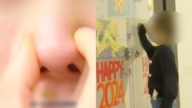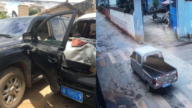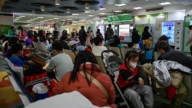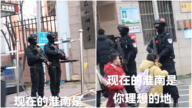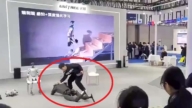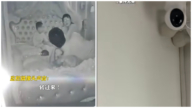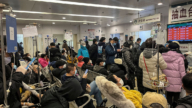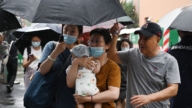【新唐人2014年04月12日讯】中共国家信访局副局长徐业安,日前在办公室内自杀身亡,原因还不清楚。但外界普遍猜测,可能和信访系统腐败案件有关。而近一年内,中国已发生多起中共官员自杀事件。
据大陆《财新网》10号报导,徐业安8号上午被发现在办公室内自杀身亡,但自杀原因并不清楚。接近国家信访局的人士证实这一消息,并说徐业安此前身体和情绪都不太好。至于为何情绪不好,目前还不清楚原因。但,《财新网》的报导已被删除。
今年59岁的徐业安,出生于湖北武汉市,2005年调任国家信访局,出任办公室主任,2011年升任副局长。徐业安最后一次在媒体上公开露面,是在3月17号。
徐业安的死引发民众诸多揣测,不少人联想到去年11月,中共国家信访局另一名副局长许杰被调查的消息。
北京社会活动家 、维权人士胡佳:“他肯定有什么问题。做的好一点,也许他良心发现,他觉得信访制度这么长时间以来,遇到很多社会压力,看到太多社会不公,然后又解决不了,他承受不了这种谴责,他自杀了。如果不好的情形,国家信访局这个单位爆发了腐败窝案,接受中纪委的调查,然后畏罪自杀。”
去年11月,许杰被调查的消息发布后,中国社会学者于建嵘在微博上发表评论说,信访部门已成为腐败重灾区,很多地方官员为了应对各种信访责任追究,通过给上级信访官员行贿来进行“销号”,一些信访官员借此获利。
大陆一些媒体也曾就信访“销号”中的腐败进行报导。
上海维权人士顾国平:“我们这么多人每个月不是被截访吗?他们都把我们拉到久敬庄。到了久敬庄登记完后,实际上登记的号码都给他们销掉了。所以呢,信访问题迟迟得不到解决。两会之前重视说要解决信访问题,两会开完之后,什么都没有了,什么消息也没有。”
根据中共官方定义, 中国的信访制度为中国特有的政治表达形式,是“下情上达”的特殊途径。但近年来,信访制度不能有效解决冤情,导致“进京上访”情况越来越严重,打压手段也越来越升级。信访也被外界批评为带有严重的“人治”色彩,损害法治权威。
顾国平:“现在劳教废除了,他们就利用刑事处罚的手段来打压我们上访冤民,这就是越来越升级了。我们老百姓、上访人员、弱势群体,没有路可走啦!”
胡佳:“公安部信访部本身就是一个龙潭虎穴,很多人进去或没进去时就被摁在车里边带走,就众目睽睽之下,公安部信访局外边这么多的摄像探头,从来也不管这样暴行的发生。它就是警匪一家的状态。”
北京社会活动家、维权人士胡佳表示,信访部门本身就存在违法行为,比如它把对法轮功学员的上访一律视为无效,以及自身的贪腐问题等。胡佳认为,解决这些问题的方法,就是司法独立。也就是说,只有结束一党专制、结束共产党的统治,中国才能改变这一切问题。
本周三,上海数千访民如常来到市政府前集会、示威,要求官员停止滥用权力、公示财产,甚至要求进行民主普选。当局出动大批公安、特警到场“维稳”,如临大敌。
近1年多来频频出现官员“自杀” 案件。仅一个月内公开报导的就有3名,如: 浙江奉化塌楼所属街道建设管理办公室副主任何高波;重庆所谓的前“打黑英雄”、渝中区分局经侦支队长周渝;中共国务院新闻办副主任李伍峰,在办公室坠楼身亡。
《中国青年报》11号报导,根据不完全统计,去年1月1号至今年4月10号期间,共有54名各级官员非正常死亡。官方认定自杀身亡者有23人,占总人数42.6%。
有网友撰文探讨说,真正有事的“大主”、“大老虎”,反而没有自杀的念头。民众注意到,接连自杀的官员几乎都是“副”职的。
采访/朱智善 编辑/王子琦 后制/黎安安
Deputy Chief of Bureau Killed Himself, Raising Speculation
Xu Ye’an, the deputy chief of the Chinese Communist Party’s
(CCP) Bureau for Letter and Calls, killed himself at his office
this week. The cause of his suicide still remains unknown.
There is speculation that the incident is related to
corruption cases in his bureau.
In the past years, there have been many high-ranking
CCP officials that committed suicide.
Caixin.com, a Chinese online media, reported on April 10
that Xu Ye’an was found to have killed himself in the office
in the morning of April 8.
A source close to Bureau for Letters and Calls (BLC) had
confirmed the report, saying Xu’s health and mental
condition had been poor before his suicide,
The cause was still reported to be unknown. Soon
afterwards, Caixin’s online report was deleted.
Xu Ye’an, who died at 59 years old, was born in Wuhan city
of Hubei Province.
He was moved to the BLC as a sector director in 2005,
and promoted to deputy chief in 2011.
Xu’s last public appearance was on March 17.
Xu’e death leads to speculation from Chinese civilians.
Many were reminded by the incident, of last November’s
report that another BLC deputy chief Xu Jie had been
put under investigation.
Hu Jia, Beijing Human Rights Activist:"Something must be
wrong with him. Maybe it was a salve for his conscience.
He felt that the BLC had long been supposed to handle
social injustice and pressure, however was unable to solve
any of them.
Its felt that he killed himself as he could not stand to feel
his conscience.
Much worse, maybe the Central Commission for Discipline
Inspection had been investigating the corrupt cases inside
the bureau, and he committed suicide to escape punishment."
Last November, after Xu Jie was announced to be under
investigation, Chinese social scholar Yu Jianrong commented
on weibo that the Letters and Calls system had become one
of the areas hardest hit by the anti-corruption campaign.
Many local officials had bribed high-ranking BLC officials
to escape punishment by eliminating petition records
from their places. Officials had benefited a lot from that.
Some Chinese media also reported on the corruption
behind BLC’s “record elimination service".
Gu Guoping, Petitioner from Shanghai:"Many of us are
blocked on our way to petition every month.
After that we were taken to a place called Jiujingzhuang
and our information was registered there.
However, indeed all records were eliminated by them (BLC).
Therefore we never see the reported problems are solved.
Before the Two Meetings, the government said they would
focus more on petitions but nothing changed afterwards.
There was no news at all about it."
The CCP officially defined the Letters and Calls system
as a political form of expression uniquely seen in China,
which is a special means for ordinary people to report
problems to party leaders.
However, over the years the system had failed to efficiently
handle injustice cases.
More petitioners choose to visit Beijing and the suppression
on them has been escalating.
Meanwhile, the system is under criticism for violating
the authority of law as a reflection of “rule of man",
instead of “rule of the law".
Gu Guoping: “After the labor camps were abolished,
they turned to using criminal penalties to suppress petitioners,
which is even worse.
As ordinary civilians, petitioners and a vulnerable group,
we almost have no way to survive."
Hu Jia: “The Letters and Calls Bureau for Public Security
itself is a trap.
Many people were forced onto vehicles before
they got there.
Even in public, along with those many cameras
outside the bureau, violence always continues.
So you see the police are no different to mafia groups."
Famous Beijing social activist Hu Jia said, the BLC itself
frequently takes illegal actions.
For example, all petitioning from Falun Gong practitioners,
or against the party’s corruptions, are never accepted.
Hu Jia believes judicial independence can be a solution
to this issue.
China can only be changed in all those fields by bringing
to an end the one-party dictatorship of the CCP.
On Wednesday, thousands of Shanghai petitioners made
their regular protests at the municipal government building.
They demanded an immediate stop to power abuse, the
declaration of officials’ properties, and democratic election.
The CCP dispatched a large group of police, including special
forces, to do a “stability maintenance" job, as if facing
formidable enemies.
In the past year, suicides of CCP officials have been frequently
reported. There were three incidents in only a month.
The death list includes He Baobo, a local official responsible
for building safety in the city of Fenghua of Zhejiang Province;
Zhou Yu, former so-called ‘hero’ in Bo Xilai’s ‘strike black’
campaign and a local crime squad chief;
Li Wufeng, deputy director of the State Council Information
Office who “fell to his death" from his office.
China Youth Daily reported a partly estimate on April 11 that,
there are 54 unnatural deaths of CCP officials between January
1 and April 10.
Twenty-three, or 42.6% of them were officially
identified as committing suicide.
An online article commented on an interesting observation
that those real “big tigers" seem never to kill themselves.
The Chinese noticed that all suicides are being committed
by those with “deputy positions".
Interview/Zhu ZhiShan Edit/Wang Ziqi Post-Production/Li An’an



